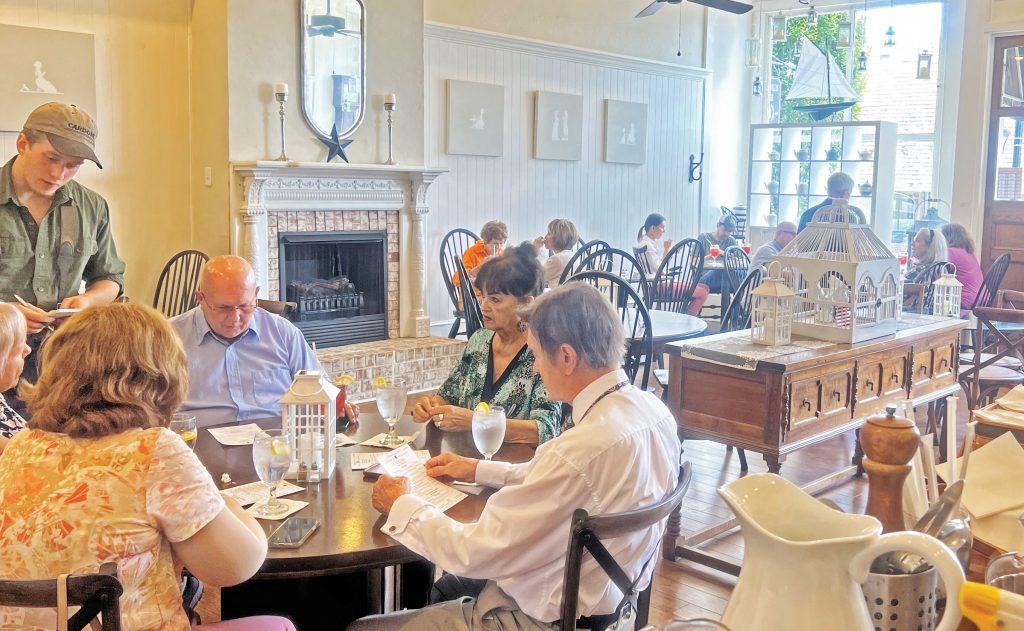
WINNSBORO- During the Aug. 26 Fairfield County council meeting, council voted unanimously to postpone the finalization of appointments for the County’s Accommodations Tax [Advisory] Committee after District 1 Councilman Dan Ruff asked then-Deputy County Administrator Synthia Williams to provide more details on how selections for the advisory committee are made.
The details Williams provided were scant, and some details appear to not be in line with state law or the county’s own guidelines concerning the appointment of the advisory committee or whether it is the county or the town who should be receiving the state accommodations tax (SAT) funds in the first place.
What are state accommodations taxes (SAT)
The state accommodation tax is a mandatory two percent charge applied to all accommodations statewide: “any rooms, campground spaces, lodgings, or sleeping accommodations furnished to transients by any hotel, inn, tourist court, tourist camp, motel, campground, residence, or any place in which rooms, lodgings, or sleeping accommodations are furnished to transients for a consideration.”
These taxes are collected by the SC Department of Revenue and then distributed back to municipalities and counties (from which they were collected) to be allocated to qualified non-profit organizations who will promote tourism for the municipalities and counties according to certain guidelines established by state law.
A county or municipality receiving more than $50,000 in revenue from the state accommodations tax must appoint a seven-member advisory committee to make recommendations for how the revenue generated from the accommodations tax should be spent. A majority of the seven members must be from the hospitality industry of the municipality or county that brings in the accommodation tax revenue. At least two of the hospitality industry members must be from the lodging industry, where applicable. One member must represent the cultural organizations of the municipality receiving the revenue.
While the advisory committee makes recommendations to the municipality or county council regarding the expenditure of the state accommodations tax proceeds, the councils may accept, reject or modify these recommendations.
Local Accommodations Tax
County and municipal governments may also impose a local accommodations tax (LAT) by ordinance adopted by a majority of the governing body. The cumulative rate of the tax may not exceed three percent.
There is no legal requirement for a municipality or county to apppoint an advisory committee for LAT expenditures. The municipal council is solely responsible for approving LAT expenditures unless otherwise established by the council, as Fairfield County council has chosen to do. Interim County Administrator Clay Killian told The Voice that the Fairfield council plans to have the SAT advisory committee also recommend to council regarding approvals of the LAT as well as hospitality tax (H-Tax) allocations to qualifying non-profit organizations who promote tourism.
Appointment of Advisory Committee Members
Fairfield county initiated a request for applications for people to serve on the Accommodations Advisory Committee in January 2024 with a March 1, 2024 deadline for submission. According to county officials, however, at least three of those applications were accepted last month, approximately four months after the deadline closed for applications and approximately a week before council was slated to appoint the members of the committee.
At issue is the $532,749 the county expects to bring in in the 2024-25 budget year – $247,749 income from state accommodation taxes (SAT); $35,000 from local accommodation taxes (LAT) revenue and $250,000 from hospitality tax (H-Tax) revenue.
While Williams told Ruff that the advisory committee must consist of seven members, she did not point out that according to Section 6-4-25 of state law, “members of the county advisory committee shall represent the geographic area where the majority of the revenue is derived (collected.) However, if a county receives more in distributions of SAT than it collects in LAT, the membership of its advisory committee must be representative of all areas of the county with a majority of the membership coming from no one area.”
Williams did not present any statistics or other guidelines at the Aug. 26, council meeting for council members to know what area in the county derives the most SAT or even if the county receives more SAT than it collects in LAT. This information is important in their decision of who is qualified and who is not to sit on the commission. Some council members told The Voice that there was no guidance available in their agenda packet regarding the appointment of the committee members.
“We should know the answers to these questions before appointing members to the advisory committee,” said one council member.
As of Aug. 26, eight people had applied to be on the seven-member committee. Their names and their areas of representation are listed here:
Charlene Herring, Ridgeway resident, past president and current board member of the Fairfield County Chamber of Commerce – Cultural Organization
Tina Johnson, Ridgeway resident and owner of a Ridgeway bed and breakfast and vice-president of the Fairfield County Chamber of Commerce – Lodging Industry
Dillon Pullen, Winnsboro resident and president of the Fairfield County Chamber of Commerce – Hospitality Industry
Susan Yenner, Winnsboro resident and owner of a Winnsboro bed and breakfast – Lodging Industry
Phyllis Watkins, Winnsboro resident and retired director of Fairfield County’s Emergency Management Dept. – At large
Dwayne Robinson, Sr., Great Falls resident and Fairfield County Sheriff’s Deputy – At large
John McMeekin, Winnsboro resident and mayor – At large
James (Jae) Burroughs, Winnsboro resident and town council member – At large
State law requires two members to be from the lodging industry. Applicants Tina Johnson and Susan Yenner each own a bed and breakfast, but if a majority of the SAT is derived from the Town of Winnsboro, Johnson might not qualify.
McMeekin and Burroughs are both Town of Winnsboro elected officials. Yet, Fairfield County’s advisory committee application form discourages elected officials from applying.
A warning appears on the application stating: “If you have a position with a government entity or serve on any governmental board or commission, acceptance of the position that you are applying for could constitute an instance of Dual Office Holding. A dual office holding situation could possibly severely impact the status of the position you already hold.”
State law requires “a majority [of the advisory committee members] be selected from the hospitality industry of the municipality or county receiving the revenue.” All of the applicants are not, and no restaurants in the towns or county’s are represented by any of the applicants.
Three applicants are high level members of the Fairfield County Chamber of Commerce, an organization that receives much of the county’s SAT funding and perhaps LAT and H-Tax funding as well. Pullen is president of the Chamber, Johnson is vice president, and Herring is past president and all three are Chamber board members.
Williams also stated that the committee applications were self-submitted, and that no solicitations were made from the county’s staff or council members. However, some applicants told The Voice that they knew about the openings on the committee because Pullen asked them to fill out the application, which could lead to a conflict of interest when recommending funding for the Chamber.
There is some leeway in choosing some of the members, but appointing elected officials and government employees might be skirting the spirit of the law.
Switch to DraftPreview(opens in a new tab)UpdateAdd title

WINNSBORO- During the Aug. 26 Fairfield County council meeting, council voted unanimously to postpone the finalization of appointments for the County’s Accommodations Tax [Advisory] Committee after District 1 Councilman Dan Ruff asked then-Deputy County Administrator Synthia Williams to provide more details on how selections for the advisory committee are made.
The details Williams provided were scant, and some details appear to not be in line with state law or the county’s own guidelines concerning the appointment of the advisory committee or whether it is the county or the town who should be receiving the state accommodations tax (SAT) funds in the first place.
What are state accommodations taxes (SAT)
The state accommodation tax is a mandatory two percent charge applied to all accommodations statewide: “any rooms, campground spaces, lodgings, or sleeping accommodations furnished to transients by any hotel, inn, tourist court, tourist camp, motel, campground, residence, or any place in which rooms, lodgings, or sleeping accommodations are furnished to transients for a consideration.”
These taxes are collected by the SC Department of Revenue and then distributed back to municipalities and counties (from which they were collected) to be allocated to qualified non-profit organizations who will promote tourism for the municipalities and counties according to certain guidelines established by state law.
A county or municipality receiving more than $50,000 in revenue from the state accommodations tax must appoint a seven-member advisory committee to make recommendations for how the revenue generated from the accommodations tax should be spent. A majority of the seven members must be from the hospitality industry of the municipality or county that brings in the accommodation tax revenue. At least two of the hospitality industry members must be from the lodging industry, where applicable. One member must represent the cultural organizations of the municipality receiving the revenue.
While the advisory committee makes recommendations to the municipality or county council regarding the expenditure of the state accommodations tax proceeds, the councils may accept, reject or modify these recommendations.
Local Accommodations Tax
County and municipal governments may also impose a local accommodations tax (LAT) by ordinance adopted by a majority of the governing body. The cumulative rate of the tax may not exceed three percent.
There is no legal requirement for a municipality or county to apppoint an advisory committee LAT expenditures. The municipal council is solely responsible for approving LAT expenditures unless otherwise established by the council, as Fairfield County council has chosen to do. Interim County Administrator Clay Killian told The Voice that the Fairfield council plans to have the SAT advisory committee also recommend to council regarding approvals of the LAT as well as hospitality tax (H-Tax) allocations to qualifying non-profit organizations who promote tourism.
Appointment of Advisory Committee Members
Fairfield county initiated a request for applications for people to serve on the Accommodations Advisory Committee in January 2024 with a March 1, 2024 deadline for submission. According to county officials, however, at least three of those applications were accepted last month, approximately four months after the deadline closed for applications and approximately a week before council was slated to appoint the members of the committee.
At issue is the $532,749 the county expects to bring in in the 2024-25 budget year – $247,749 income from state accommodation taxes (SAT); $35,000 from local accommodation taxes (LAT) revenue and $250,000 from hospitality tax (H-Tax) revenue.
While Williams told Ruff that council that the advisory committee must consist of seven members, she did not point out that according to Section 6-4-25 of state law, “members of the county advisory committee shall represent the geographic area where the majority of the revenue is derived (collected.) However, if a county receives more in distributions of SAT than it collects in LAT, the membership of its advisory committee must be representative of all areas of the county with a majority of the membership coming from no one area.”
Williams did not present any statistics or other guidelines at the Aug. 26, council meeting for council members to know what area in the county derives the most SAT or even if the county receives more SAT than it collects in LAT. This information is important in their decision of who is qualified and who is not to sit on the commission. Some council members told The Voice that there was no guidance available in their agenda packet regarding the appointment of the committee members.
“We should know the answers to these questions before appointing members to the advisory committee,” said one council member.
As of Aug. 26, eight people had applied to be on the seven-member committee. Their names and their areas of representation are listed here:
Charlene Herring, Ridgeway resident, past president and current board member of the Fairfield County Chamber of Commerce – Cultural Organization
Tina Johnson, Ridgeway resident and owner of a Ridgeway bed and breakfast and vice-president of the Fairfield County Chamber of Commerce – Lodging Industry
Dillon Pullen, Winnsboro resident and president of the Fairfield County Chamber of Commerce – Hospitality Industry
Susan Yenner, Winnsboro resident and owner of a Winnsboro bed and breakfast – Lodging Industry
Phyllis Watkins, Winnsboro resident and retired director of Fairfield County’s Emergency Management Dept. – At large
Dwayne Robinson, Sr., Great Falls resident and Fairfield County Sheriff’s Deputy – At large
John McMeekin, Winnsboro resident and mayor – At large
James (Jae) Burroughs, Winnsboro resident and town council member – At large
State law requires two members to be from the lodging industry. Applicants Tina Johnson and Susan Yenner each own a bed and breakfast, but if a majority of the SAT is derived from the Town of Winnsboro, Johnson might not qualify.
McMeekin and Burroughs are both Town of Winnsboro elected officials. Yet, Fairfield County’s advisory committee application form discourages elected officials from applying.
A warning appears on the application stating: “If you have a position with a government entity or serve on any governmental board or commission, acceptance of the position that you are applying for could constitute an instance of Dual Office Holding. A dual office holding situation could possibly severely impact the status of the position you already hold.”
State law requires “a majority [of the advisory committee members] be selected from the hospitality industry of the municipality or county receiving the revenue.” Four out of the eight applicants appear to have no connection with the hospitality industry. Also, no one from any or the 20 or so restaurants in Winnsboro or any restaurants in the county are being considered for the advisory committee and have not submitted applications.
Three applicants are high level members of the Fairfield County Chamber of Commerce, an organization that receives much of the county’s SAT funding and perhaps LAT and H-Tax funding as well. Pullen is president of the Chamber, Johnson is vice president, and Herring is past president and all three are Chamber board members.
Williams also stated that the committee applications were self-submitted, and that no solicitations were made from the county’s staff or council members. However, some applicants told The Voice that they knew about the openings on the committee because Pullen asked them to fill out the application, which could lead to a conflict of interest when recommending funding for the Chamber.
There is some leeway in choosing some of the members, but appointing elected officials, government employees, and applicants not representing the hospitality industry at all might be skirting the spirit of the law.
In deciding whether the applicants meet the qualifications to serve on the committee, council must understand the legal qualifications for the makeup of the committee as well as the applicants’ areas of representation. They must also know which area receives the majority of the SAT funding and if the county receives more SAT revenue than LAT revenue.
Until these and other questions are answered, council members will have little information on which to base their votes.
This story has been updated to provide more information about the SAT, LAT and H-Tax collection and distribution.











